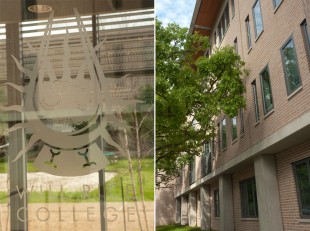Will Rice College has been described by its residents as “competitive,” “intense” and “spirited.” Now they can add “silver.”

The U.S. Green Building Council recently awarded the Will Rice College addition project Silver certification from the Leadership in Energy and Environmental Design program.
The U.S. Green Building Council recently awarded the Will Rice College addition Silver certification from the Leadership in Energy and Environmental Design (LEED) program.
LEED certification is an internationally recognized standard for the design, construction and operation of eco-friendly buildings. It is awarded to projects designed and built to universally accepted criteria for energy efficiency, material conservation, water efficiency, indoor environmental quality and stewardship of resources and sensitivity to their impacts.
The project, which began in 2009 and was completed in just 15 months, included the demolition of the 1955 wing of Will Rice and the addition of a new bed tower and rooftop terrace and numerous green elements.
Among the project’s sustainable highlights are:
- The clay tiles from the old wing were salvaged and reused on the Baker College addition, a project that was under way at the same time as the Will Rice renovation.
- The Will Rice addition has a smaller footprint than the building it replaced and allowed some of the land formerly covered by the old building to be returned to green space as well as to a public plaza.
- Double-paned windows with low-emissivity glass keep the summer heat out while letting light in. More than 90 percent of the building’s interior receives natural daylight, which minimizes the need for electric lights during daytime.
- Bathroom “pods,” 7-foot-by-7-foot prefabricated rooms designed to be easily connected inside the building after they were delivered to the construction site, saved construction time and minimized error and waste. Within the pods are water-efficient fixtures, including dual-flush toilets and low-flow showerheads. These fixtures help make the addition more than 40 percent more water-efficient than if traditional fixtures had been installed. The water saving from toilets, sinks and showers is estimated at around 300,000 gallons per year.
- Student rooms were constructed using paints, adhesives and sealants with reduced emissions to provide a healthier indoor-air quality. Lights in the rooms also operate using a motion/infrared-detection system that turns off the lights when the room is unoccupied.
- The heating and cooling system is designed to conserve energy and functions using Rice’s energy policy temperature guidelines.
- Front-loading Energy Star washing machines that use less water and energy to clean clothes. (This is the university standard now.)
- Fifty-four bicycle spaces were installed.
Overall, the Will Rice addition is estimated to be about 30 percent more energy-efficient than conventional approaches to design. Almost 90 percent of all construction and demolition waste during the renovation project was recycled; a total of 2,188 cubic yards of waste was diverted from the landfill.
“Being an alumnus of Will Rice College, I am particularly pleased that the newest addition to my old college reflect the university’s commitment to designing and constructing facilities that meet the high environmental standards of the LEED program,” said Richard Johnson ’92, Rice’s director of energy and sustainability and professor in the practice of environmental studies. “The mascot of Will Rice College is the phoenix, a mythical bird that is reborn from its old ashes. I view this new addition to Will Rice as a green phoenix that rose from the ashes of the old 1955 wing.”
The Will Rice College addition is the eighth Rice building to become LEED-certified, and joins Duncan and McMurtry colleges as well as the Wilson House (the Wiess College masters’ house) as the fourth residential college building to receive LEED certification.


Leave a Reply